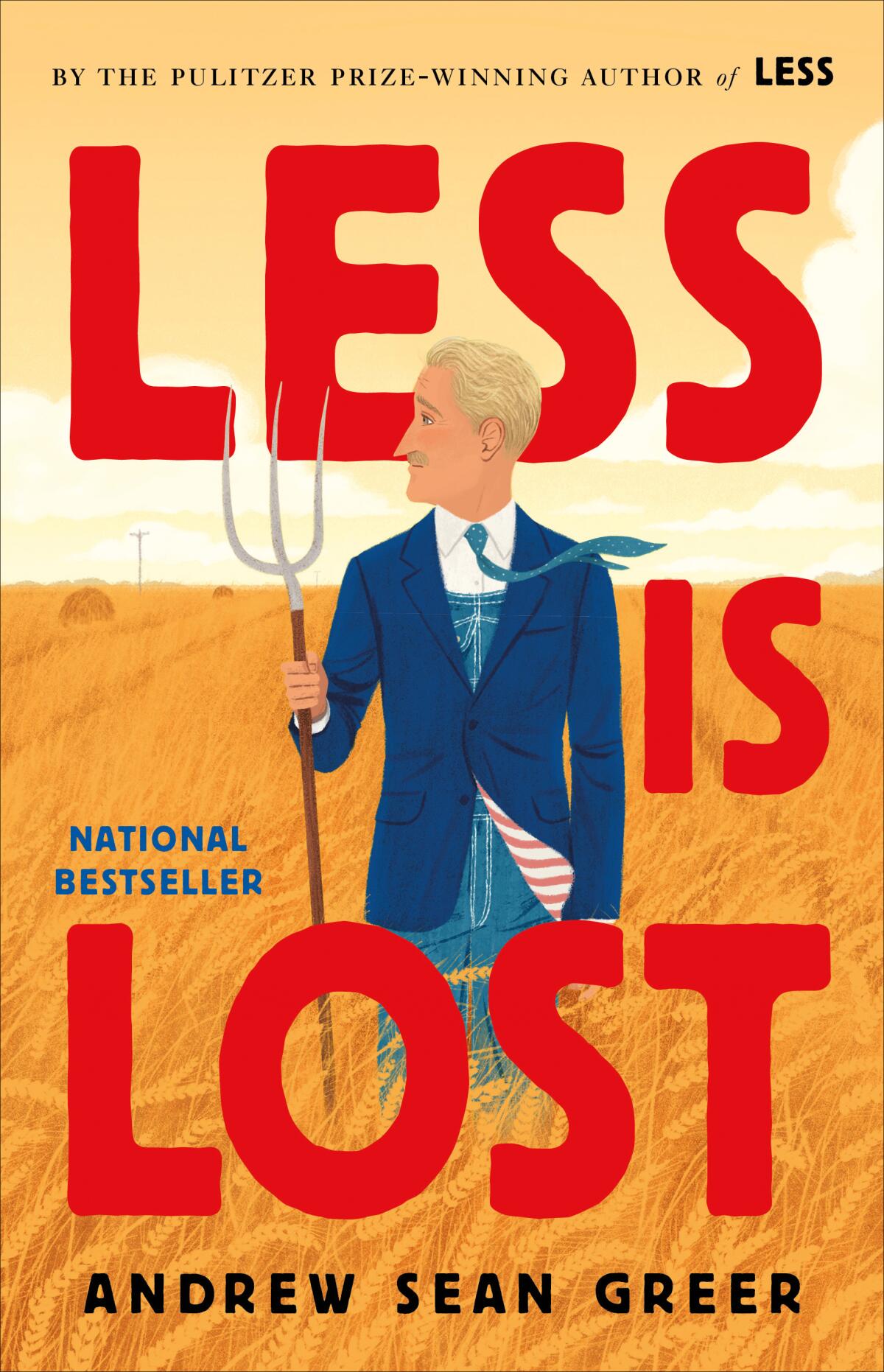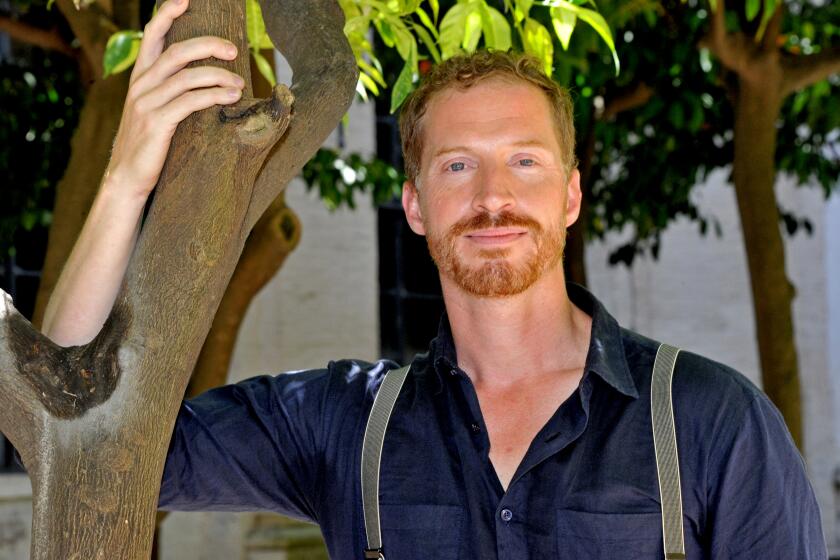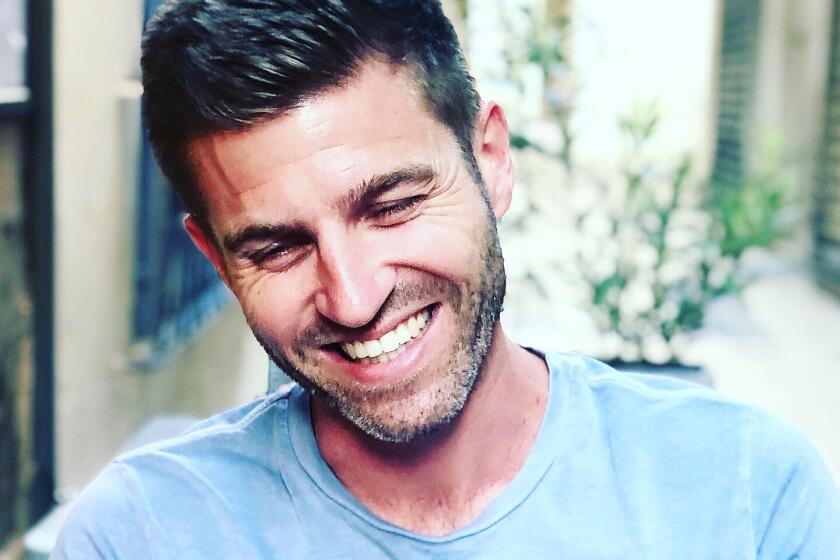Review: ‘Less Is Lost,’ sequel to a Pulitzer winner, finds a path to both satire and tears

- Share via
On the Shelf
Less Is Lost
By Andrew Sean Greer
Little, Brown: 272 pages, $29
If you buy books linked on our site, The Times may earn a commission from Bookshop.org, whose fees support independent bookstores.
Andrew Sean Greer surprised a lot of observers when he won the Pulitzer Prize in fiction for his 2017 novel, “Less.” Comic novels generally don’t do well on the major awards circuit. (Ask Gary Shteyngart or Nell Zink, Sam Lipsyte and so on.) But “Less” was exceedingly well made, a witty tale about Arthur Less, a middle-age, insecure, weak-selling gay literary novelist who hits the eject button on his life after a breakup to take a whirlwind trip around the world. Coincidentally, among the targets of Greer’s gentle ribbing was the Pulitzer Prize itself. “You win a prize, and it’s all over,” a poet tells Arthur. “You lecture for the rest of your life. But you never write again.”
The punch line there was that Arthur desperately wanted to win one of those prizes anyway. And it’s a pretty good punch line now, because Greer not only won the Pulitzer but has in fact written again. “Less Is Lost” is a familiar-feeling sequel to its predecessor, which seems to bode ill for its prospects. But if Greer is just reapplying the “Less” formula — insecure, weak-selling, whirlwind trip, etc. — it’s one that allows for plenty of invention and flexibility. Take an uncertain man, a “middle-aged gay white novelist nobody’s ever heard of,” and put him in a host of places he’s uncomfortable in, especially when he’s uncomfortable everywhere, and some amount of hilarity is bound to ensue. Early on we are promised “a donkey, a pug, a whale, and a moose.” In due time the full menagerie arrives.
This time, Less’ travels are restricted to the United States, with Arthur making a mad cross-country dash as privation chases his heels. After the death of his former longtime lover Robert, a Pulitzer Prize-winning poet, Arthur learns that probate court is dunning him for years of back rent in Robert’s San Francisco home. So he’s compelled to take gigs that are respectable but a tick diminishing for a would-be famous author: judging a literary prize; writing a magazine profile in the Southwest; supervising a musical version of one of his stories in the Southeast; taking a speaking tour up the Atlantic coast.
‘Less Is Lost’ is a sequel to Andrew Sean Greer’s Pulitzer Prize-winning novel, He describes the road trip that inspired it — and the joys of travel.
An identity crisis and deadline pressure will make a writer do funny things, and soon Arthur is roped into an RV trip with a George R.R. Martin-esque writer who’s searching for his daughter. In the process, Arthur unwittingly takes a hallucinogen, plays a lead role in a water-based catastrophe and once again deploys his painfully mediocre German, one of the best items in Greer’s joke bag. Confronted with a group of German nudists, Arthur becomes flustered. “Also shy I am!” he offers lamely. Told they’re talking about breakups, his phrase-book German can’t match the subject he knows best. “Here is a sad conversation,” he tries.

Sad conversation he has, often. Shy he is — entertainingly so. But the truly remarkable thing about “Less” winning the Pulitzer isn’t that it’s a comedy; it is that, at heart, it’s a romance, a genre that faces an even rougher road with prize juries. All the globetrotting in “Less” set a path toward a happily ever after. A similar story is at play in “Less Is Lost,” as Arthur wends his way from San Francisco to Maine, where his beloved, Freddy, is teaching. The RV he drives is nicknamed Rosina, a name that echoes Rocinante, the steed Don Quixote rode in search of his Dulcinea.
The sequel is also thick with matters of love, family and home — when it takes a break from its various face-plants, misunderstandings and yes, that moose. Arthur is striving to reconnect not just with Freddy but also with his long-absent father. In that context, every gag, misstep and line of clumsy German serves the themes of loss and recovery, from the sweater in Arthur’s luggage that’s torn to bits by an electric razor to America itself. “America, how’s your marriage?” Greer writes. “Your two-hundred-fifty-year-old promise to stay together in sickness and in health? ... Who betrayed whom, in the end? I hear you tried getting sober. That didn’t last, did it?”
The latest from Ling Ma, Yiyun Li, Russell Banks and Namwali Serpell as well as exciting newcomers round out our critics’ most anticipated fall books.
Amid all this, Arthur struggles with the question of what makes him lovable — and if not his writing, then what is it? (A late plot twist in the novel cleverly complicates this question.) That sense of self can be hard on people surrounding a writer, as Freddy — the novel’s actual narrator — points out. “There may be writers whose imaginations are so fertile, they merely plant the seeds and water them regularly, and a novel blooms every year or so — and lucky are those authors’ partners. But all the other writers, it seems, must provide their own manure.”
To extend the metaphor, Arthur generates a lot of muck. What makes his novels funny is Greer’s understanding of how absurdly writers will contort their psyches to feel like they count, like they’re loved. (That’s why it’s better that Less himself isn’t the narrator; it would read as crushingly heartsick, if not a tick mad.) These contortions are also what make the books poignant. The tricky part is balancing the two modes via tone, style and plot. Greer’s task is to ground the absurdity in tenderheartedness without being cute or cloying. In that regard, he masters both — the embarrassing moment but also the gentle grace note — as when he captures the bereft mood of a wake: “Through the window, piano music steals in softly and, finding nothing worth taking, steals back out again and goes silent.”
Early on, Arthur is told by his former lover, the Pulitzer-winning poet, a kind of secret for success, both as a writer and as a person: “Pay attention. ... That’s all you need to do. Pay attention.” The punch line there is that the world is so full of distractions that Arthur misses the opportunity to do that, or finds himself paying attention to the wrong things. That leads to the moments of misdirection that are the lifeblood of funny novels. But trying to pay attention is touching too: Like writing a novel or finding a happy place to call home, it’s hard, worthy work.
Grant Ginder has made an art out of dysfunctional comedy that goes to dark places. He talks about the roots of his latest, ‘Let’s Not Do That Again.’
Athitakis is a writer in Phoenix and author of “The New Midwest.”
More to Read
Sign up for our Book Club newsletter
Get the latest news, events and more from the Los Angeles Times Book Club, and help us get L.A. reading and talking.
You may occasionally receive promotional content from the Los Angeles Times.











